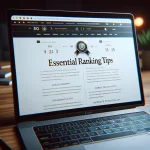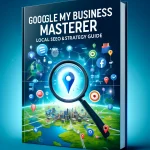Table of Contents

Key Takeaways
- Local SEO helps your business appear in search results when people are looking for services or products in your area.
- Social media boosts your local presence by engaging with the community and showcasing your business personality.
- Combining SEO and social media strategies can increase your discoverability and build trust with potential customers.
- Keywords are crucial in both SEO and social media – use them wisely to connect with your local audience.
- Tracking your progress with the right tools can help you understand what’s working and what needs tweaking.
Why Social Media & SEO Matter for Your Local Business
Think of the last time you needed a new coffee spot or a handyman. Where did you look? If you’re like most people, you pull out your phone and do a quick search or ask for recommendations on social media. This is why you need a strong local SEO and social media presence. They are your digital storefronts, and they need to be inviting.
Direct Impact on Local Discoverability
Here’s the deal: when people search for businesses nearby, search engines pull up the most relevant results. If your local SEO is on point, your business will show up right when potential customers are looking for what you offer. It’s like having a billboard right where all the eyes are.
Building Trust with Your Community
But it’s not just about being seen; it’s about building a relationship with your community. When your business actively posts on social media, responds to reviews, and engages with customers, you’re building trust. People buy from businesses they know and trust. That’s a fact.
Starting with the Basics: SEO & Social Media Defined
Before we dive into the how-to, let’s make sure we’re on the same page about what SEO and social media are all about.
What is SEO and How Does it Work?
SEO stands for Search Engine Optimization. It’s a bunch of techniques that help your business show up in online searches. Think about the words or phrases people use when looking for your products or services. Those are your keywords. Use them on your website, in your blog posts, and anywhere you have content online. That way, search engines know how to show your business to people searching for those terms.
The Role of Social Media in Business Promotion
Social media is your digital megaphone. It’s where you can shout out about your latest offer, share stories about your customers, or post that irresistible photo of your newest product. But it’s not just about broadcasting; it’s about conversation. When you chat with your followers, answer their questions, and show you care, you’re building a community around your brand.
Leveraging Social Media for SEO Benefits
Now, let’s get into the good stuff—how to use social media to boost your SEO.
Amplify Your Content Through Social Channels
Every time you create content for your website, think of how you can share it on social media. Got a new blog post? Tweet it out. A how-to guide? Post a teaser on Facebook and link back to your site. This not only gets more eyes on your content but can also lead to more traffic to your website, which is great for SEO.
Encouraging Social Sharing to Build Links
When people share your content, they’re giving you a thumbs-up that search engines notice. It’s like they’re vouching for you. And when your content gets shared, it can lead to backlinks—other sites linking to yours—which is SEO gold. Encourage sharing by creating content that’s helpful, entertaining, or both.
Enhancing Local SEO Through Social Media
Local SEO is about getting your business to pop up right when locals are looking. Social media isn’t just for posting selfies and what you had for lunch; it’s a powerhouse tool for local businesses. By being active on social platforms, you’re telling search engines that you’re not just relevant, but you’re also a buzzing spot in the community.
Think of it this way: when you engage on social media, you’re not shouting into the void. You’re having a conversation in the town square where everyone can hear you. And when search engines see that you’re the talk of the town, they’ll want to put you front and centre in search results.
Here’s the kicker: it’s not just about posting regularly. It’s about posting the right content—content that resonates with your local audience and gets them talking. That’s what gets you noticed by search engines and potential customers alike.
Importance of Local Engagement and Reviews
Reviews are the lifeblood of local businesses. A glowing review can be the deciding factor for someone choosing where to eat, shop, or get their car fixed. And guess what? Search engines love reviews too. They see good reviews as a sign that your business is trustworthy and authoritative in your area.
So, encourage your happy customers to leave reviews on your social media pages and platforms like Google My Business. Respond to these reviews—yes, even the not-so-great ones. This shows that you value customer feedback and are always striving to improve. That’s the kind of business search engines, and customers love to support.
Utilizing Social Media Check-Ins and Geotags
Remember when everyone was checking in on social media? That trend is your friend. Encourage customers to check in at your location. It’s like they’re planting a digital flag that says, “I’m here, and it’s great!” This not only spreads the word to their friends but also sends location-based signals to search engines.
And don’t forget about geotags. When you post on social media, tag your location. It’s another way to tell search engines where you are and to show up in local searches. Plus, it helps people find you when they’re searching for places nearby.
- Ask customers to check in on social media when they visit.
- Use geotags in your posts to improve local discoverability.
- Respond to reviews and engage with customers to boost your online reputation.
Now, let’s optimize those profiles for maximum impact.
| Strategy | Benefits |
|---|---|
| Optimise social media profiles for local search | Ensure your business name, address, contact information, and other key details are accurate and consistent across all social platforms to improve local visibility |
| Create hyper-local social content | Post about community events, local landmarks, and other content that resonates with your Swansea-based audience to build engagement |
| Leverage user-generated content | Encourage customers to share photos, reviews, and experiences on your social channels to build social proof and engagement |
| Partner with local Swansea influencers | Collaborate with micro-influencers or community leaders who have a strong local following to expand your reach |
| Run location-targeted social ads | Use the geo-targeting capabilities of social platforms to deliver ads to users within the Swansea area |
| Participate in local Swansea social groups | Join and engage with Facebook groups, Nextdoor, or other local online communities relevant to your business |
| Promote local Swansea events and offers | Showcase any in-store promotions, events, or other time-sensitive updates to drive foot traffic and sales |
| Monitor and respond to Swansea reviews | Promptly address both positive and negative feedback to build trust and reputation within the local Swansea market |
| Analyse performance and iterate | Use social media analytics to track key metrics like engagement, reach, and conversions, then adjust your strategy accordingly |
| Optimise for local SEO | Ensure your website and online listings are optimised for Swansea-specific keywords and location-based searches to improve visibility in local SERPs |
| Implement schema markup | Use structured data to provide search engines with more context about your Swansea business, products, and services[5] |
| Build local citations and backlinks | Distribute your NAP (name, address, phone) data to relevant Swansea directories and earn high-quality local backlinks[3][5] |
Optimising Your Social Media Profiles for SEO
- Ensure your business name, address, and phone number (NAP) are consistent across all platforms.
- Use relevant keywords in your bio and posts to help search engines understand what you do.
- Link back to your website to drive traffic and improve your site’s SEO.
Your social media profiles are like billboards for your business. Make sure they’re complete, up-to-date, and—most importantly—consistent. This helps search engines, and potential customers, know that you’re the real deal. For more insights, check out our guide on creating engaging, targeted SEO plans.
But there’s more to it than just filling in the blanks. Your social media profiles can be SEO powerhouses if you use them right. Sprinkle relevant keywords into your bio and posts. This helps search engines connect the dots between what people are searching for and what you offer.
And don’t forget to link back to your website. This drives traffic to your site, which is a big thumbs-up in the eyes of search engines.
Keyword Implementation in Social Media Bio
Let’s talk about your social media bio. It’s not just a place to say “hello” to your visitors; it’s prime real estate for your keywords. Use words that people would use to search for your business. If you’re a bakery, use words like “pastries,” “fresh bread,” or “wedding cakes.” Make it easy for search engines to figure out what you do and for customers to find you.
Creating Shareable Content to Drive Traffic
Here’s a secret: the best kind of content is the kind that gets shared. Why? Because it means people love it enough to pass it on. And when they share your content, they’re spreading the word about your business for you. That’s free advertising, my friend.
Create content that’s useful, informative, or just plain fun. Think tutorials, behind-the-scenes looks, or customer spotlights. When you provide value, people will want to share it. And the more they share, the more traffic you’ll get to your site—which is exactly what you want.
Smart Content: Uniting SEO and Social Media Strategies
Now, let’s bring it all together. Smart content is content that works hard for you. It’s not just about throwing up a blog post or a tweet and calling it a day. It’s about creating content that serves a purpose—content that’s optimized for search engines and designed to engage on social media. Learn more about crafting an effective local content strategy to further enhance your SEO and social media efforts.
It’s a two-pronged approach: create content that ranks well in search engines and gets people talking on social media. This is how you create a buzz around your business that’s too loud to ignore.
Crafting Content That Ranks and Engages
To craft content that ranks and engages, you need to know what your audience is looking for. Use tools like Google Keyword Planner to find out what people are searching for. Then, create content that answers those questions or solves those problems. Make it easy to read, and even easier to share.
The Power of Visuals: Images and Video in SEO and Social Media
Never underestimate the power of a good image or video. People are visual creatures. We’re drawn to pretty pictures and engaging videos. Use this to your advantage. Include eye-catching images in your posts and on your website. Create videos that show off your products or services. Not only do these visuals make your content more engaging, but they also make it more shareable, which is great for SEO.
Tracking Your Progress: Tools and Metrics to Watch
Last but not least, let’s talk about tracking your progress. You can’t manage what you don’t measure. Use tools like Google Analytics to see how much traffic your website is getting and where it’s coming from. Look at metrics like shares, likes, and comments on social media to gauge engagement.
But don’t get bogged down in the numbers. The most important metric is whether your efforts are helping you reach your business goals. Are you getting more foot traffic? Are your sales going up? That’s the real measure of success.
Key Performance Indicators (KPIs) for Social Media
Alright, you’re posting on social media and you’ve got your SEO humming along, but how do you know if it’s working? You need to keep an eye on your Key Performance Indicators, or KPIs. These are the signposts that tell you whether you’re on the right track. For social media, focus on metrics like:
- Engagement rates: likes, comments, shares, and replies.
- Followers growth: how many new people are joining your community?
- Click-through rates: the percentage of viewers who click on a link in your post.
- Conversion rates: how many of these clicks turn into actual sales or leads.
These numbers give you a snapshot of how well your content is resonating with your audience and if it’s motivating them to take action. For a deeper understanding of these metrics, check out our guide on creating engaging, targeted SEO plans.
Measuring SEO Success: What to Look Out for
For SEO, it’s a bit different. You’re looking at things like:
- Organic traffic: the number of visitors coming to your site from search engines.
- Search rankings: where your pages show up in search results for your target keywords.
- Bounce rate: the percentage of visitors who leave your site after viewing only one page.
- Local visibility: how often your business shows up in local search features like Google’s Map Pack.
Keep track of these metrics over time, and you’ll start to see patterns. Maybe you’ll notice that posts about certain topics get more engagement, or that some keywords bring in more traffic than others. Use this info to refine your strategy and double down on what works. For more in-depth strategies for improving your local visibility, consider exploring additional resources.
Case Study: A Local Business Winning with Social Media & SEO
Let’s look at a real-life example. There’s this bakery in town that’s killing it with its local SEO and social media synergy. They started by optimizing their Google My Business listing with all the right details and keywords. Then, they got active on Instagram, sharing mouth-watering photos of their daily specials with geotags and local hashtags.
They encouraged customers to post photos with their treats and tag the bakery. Pretty soon, they were a local Instagram sensation. And guess what? Their search rankings started to rise, too. People looking for “best pastries near me” or “fresh bread in [town name]” started finding them at the top of their searches. Their secret? Consistency, engagement, and a keen eye for what their customers love.
Final Thoughts: The Future of Social Media and SEO Integration
Here’s the thing: social media and SEO aren’t just passing trends; they’re how businesses get noticed in the digital age. The future is all about integration. It’s not enough to just have a website or a Facebook page. You need to weave these tools together into a strategy that puts your business in front of the right eye at the right time.
Keep an eye on new features and trends in both SEO and social media. Things like voice search and augmented reality are just around the corner, and they’re going to change the game again. Stay flexible, stay curious, and always be ready to adapt. That’s how you’ll stay ahead of the curve.
And remember, this isn’t a one-and-done deal. It’s a marathon, not a sprint. Keep refining your approach, keep engaging with your community, and keep providing value. Do that, and you won’t just boost your visibility; you’ll build a loyal customer base that’ll stick with you for the long haul.
Frequently Asked Questions (FAQ)
How Often Should I Post on Social Media for SEO Benefits?
You might be wondering how often you need to post on social media to see a bump in your SEO. The answer isn’t one-size-fits-all, but here’s a good rule of thumb: aim for consistency over quantity. Whether that’s once a day or a few times a week, what matters is that you’re regularly showing up for your audience.
But don’t just post for the sake of posting. Make sure your content is engaging and relevant to your local community. That’s what will get people to interact with your posts and share them, which is what gives you that SEO juice.
Can Social Media Replace Traditional SEO Techniques?
Short answer: no. Think of social media as the cherry on top of your SEO sundae. It’s an important part of your overall strategy, but it can’t replace the fundamentals like keyword optimization, link building, and creating high-quality content for your website. You need both to truly succeed online.
Are Paid Social Media Ads Beneficial for SEO?
Paid social media ads don’t directly affect your SEO, but they can amplify your content and increase its reach. This can lead to more engagement and potentially more backlinks, which do help your SEO. So while paid ads aren’t a direct ranking factor, they can indirectly boost your SEO efforts.
How Do I Measure the ROI of Social Media and SEO?
Measuring the ROI of social media and SEO can be tricky, but it’s doable. Start by setting clear goals, like increasing website traffic or generating more in-store visits. Then, track your metrics closely. Use tools like Google Analytics for your website and the analytics provided by your social media platforms to see how your efforts are translating into real results.
Remember, ROI isn’t just about dollars and cents. It’s also about brand awareness and customer loyalty, which can be harder to quantify but are just as valuable in the long run.
What Are the First Steps in Creating a Social Media Strategy for My Local Business?
If you’re just starting with social media for your local business, here’s how to kick things off:
1. Define your goals: What do you want to achieve with social media? More brand awareness. More traffic to your website?
2. Know your audience: Who are your customers, and what social platforms do they use?
3. Create a content calendar: Plan out what you’ll post and when. This helps you stay consistent and organised.
4. Engage: Don’t just post and ghost. Respond to comments, ask questions, and be part of the conversation.
5. Analyse and adjust: Keep an eye on those KPIs and tweak your strategy as needed.
- Best UK Accountants for Doctors, Specialist Services & Advice – 4 September 2024
- Law Firm Local SEO: Strategies & Guidance for Legal Practice Ranking – 3 June 2024
- WordPress SEO Guide: Top Blogger Tips & Essential Ranking Strategies – 13 April 2024






